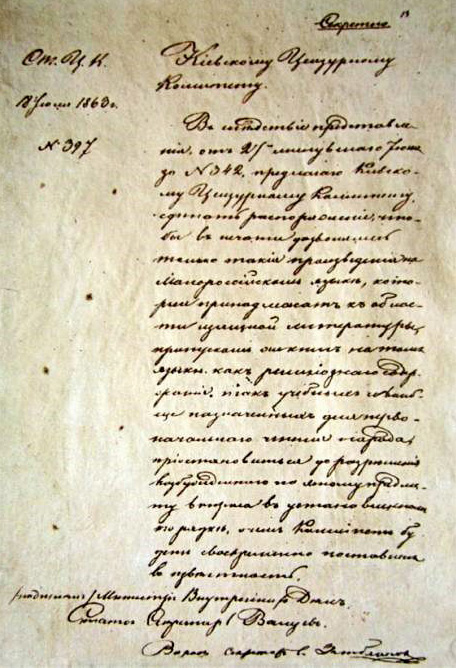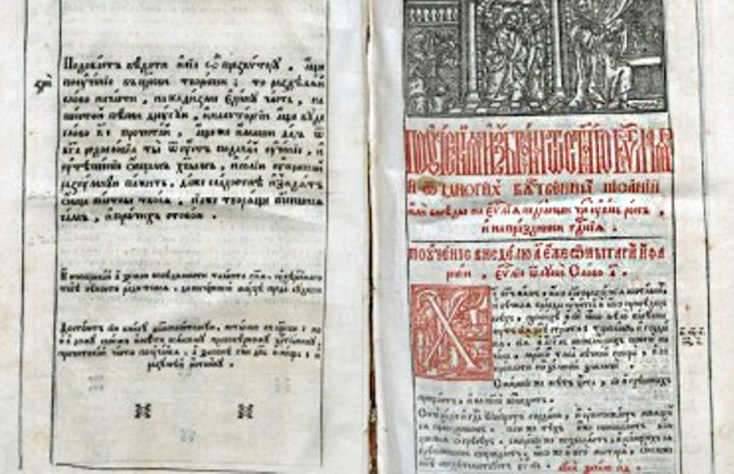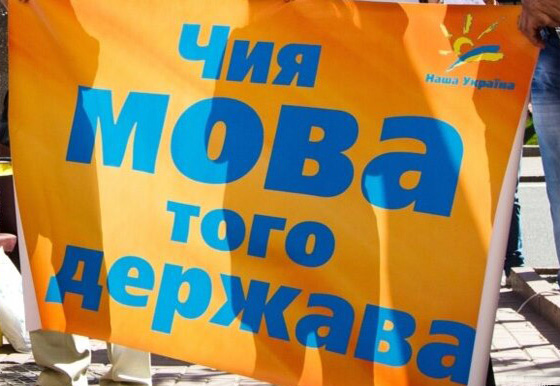Photo. The slogan at the event to support the Ukrainian language. Inscription on the slogan: “The country belongs to the one whose language is spoken within it”.
https://www.radiosvoboda.org/a/29795878.html
Quite a suitable untrue was applied for imposing the policy of the Russian language domination in Ukraine. It seems that there was no forcing in favour of the Russian language. This statement is nothing and contradicts even the obvious facts. The only reason of the ‘voluntary’ shift into the different language was the loss of sovereignty at the certain territories. For instance, the Ukrainians of Volyn (Volhynia) and Halytsia (Galicia) in the 1920-1930s (these lands were within Poland at that time period) were made to study the Polish language but not due to the own desire to use this language in everyday communication. The one who occupies always induces his own! During the period when the Ukrainian lands were within Rzeczpospolita in 16th-18th centuries, the Ukrainian nobility was made to acquire the Polish language and culture (spolshchennia) though the Ukrainian language was officially recommended for the business papers and records. The protests of the Ukrainian nobility in the Sejm and in the letters addressed to the Polish king against the suppression of the Ukrainian language did not have any influence. The point is that all the letters to the authorities and the king had to be composed only in Polish and the Cossacks had to apply it beyond any doubt.
The tendency of spolshchennia or polonization was slowed down in the Ukrainian society only after establishing the Ukrainian state in the 17th century – Hetmanate (Zaporozhian Host). However, the Right-Bank Ukraine (Pravoberezhzhia) and the Western Ukraine remained under control of Poland until the end of the 18th century and as the result, the Ukrainian nobility was mostly polonized.
By the time of the first treaty between Hetmanate (Hetmanshchyna) and Muscovy in 1654, the tendency of zrosiishchennia (acquiring the Russian language and culture or russification) gradually started. In 1687, the treaty of Kolomak Articles writes “unite the Ukrainian folk by various means with the Russian folk and bring them into strong and undone agreement by marriages and other ways”.
The first attempts of Muscovy to combat the Ukrainian language were evidenced in 1622 when tsar Mikhail Aleksejovich ordered to burn all the copies of Didactic Gospels by Kyrylo Stavrovetsky Tranquillon.
Starting from the 18th century, the suppressing of the Ukrainian language became apparent. The tsar’s ukazy (decrees) dd 1722-1724 along with the 1734-year Senate decree demanded the Russian language to be applied for all the records processed in Hetmanate. In 1769, the Synod did not allow the publishing house of Kyiv-Pechersk Lavra (Kyivo-Pecherska Lavra) to publish Bukvar (the ABC Book) in the Ukrainian language for the Ukrainian schools. After two empires, the Russian Empire and the Austrian Empire, divided Rzeczpospolita in 1832, all the schools located at the Right-Bank Ukraine had to start teaching in the Russian language. It was about that time when the idea appeared that “the Ukrainian language is really Russian but spoiled by Polish”.
One cannot help mentioning the notorious the Valuev Circular dd 1863 and the Ems Ukaz dd 1876. The former claimed that “there has not been any Ukrainian language, there is no one and could not be in the future”.


The Soviet Union modified the imperial approaches in accordance to the new reality. A short period of ukrainizatsiia (ukranization) in 1923-1933 was directed to calming down the Ukrainian community who continued their fight against the Bolsheviks occupation and to detecting the politically active Ukrainians rather than to the promoting and spreading of the Ukrainian language among the population. After lifting the ukrainizatsiia measures, almost all its followers were physically destroyed by the Communist system.
In 1933, Stalin expressed the demand to Molotov by the telegram that all the schools in Ukraine were required to start operating in the Russian-language mode of teaching and all the newspapers and books to be published only in Russian. In 1928, the Ukrainian spelling was forbidden. The Russian-Ukrainian dictionaries published in 1937 and 1948 were based on the approach of maximal coping of the Russian lexical content in the Ukrainian manner, that was phraseological blueprint copying from Russian.
In 1938, Radnarkom (Council of People's Commissars of the Ukrainian SSR) and the Central Committee of the Communist Party of Ukraine approved the decree “On Compulsory Studies of the Russian Language in Non-Russian Schools of Ukraine”. In 1959, the session of Verkhovna Rada (Supreme Council) of Ukrainian SSR adopted the law, according to which the parents in Ukraine acquired the right to “choose” the language of tuition for their children. The results of such policy led to the following: in 1985 there were no Ukrainian schools in Chernihiv and Mykolaiv (Mykolayiv), only 10 Ukrainian schools were left in Dnipro, only 35 Kyiv schools out of 267 taught in Ukrainian! During the period of 1988–1989, the number of students in the schools with the Russian language of tuition totaled 51.8% of the Ukrainian school students though the ethnic Russians made up only 22.07% of the population.
The final violation on the Ukrainian language was the adoption of the law “On the Languages of the Ethnic Groups in the Ukrainian Soviet Socialistic Republic” dd 24 April 1990, according to which Russian was proclaimed to become the official language.
Apart from the obvious limitations against the Ukrainian language on the legal bases, the intolerable moral pressure was bearing certain influence on the Ukrainian native speakers in the Ukrainian Soviet Socialistic Republic. It was as far as the 1920s when the theory of “cultures’ fight” appeared: Russian was regarded as the advanced language of the city and science while Ukrainian was considered to be the retarded language of the village. It was highlighted that the versatile and profound study on the achievements of the humanity was impossible without the knowledge of the Russian language! Moreover, not only living under the administrative limitations along with the moral and psychological burden, but also avoiding the possible persecution, since the usage of the Ukrainian language could serve as the aggravated factor in political accusations which the Communist regime was extensively applying for all the population, provoked that the significant part of the Ukrainians had to shift into the Russian language.
The current article relies on the open source information and quotes the book by V. Brekhunenko (Брехуненко В. Війна за свідомість. Російські міфи про Україну та її минуле.‒ К., 2017 ‒ 280 с.)
Our Advice to Read:
Овсюк О.М. Поле битви – мова.– Київ: ЗАДРУГА, 2017.– 32 с.
Кожевніков В. Сувора розмова про «язик» і мову.– 9-те вид., допов.– Київ: Панмедія, 2016.– 63 с.
Куземська Г. Нездоланна Україна: Хроніка нищення української Церкви, мови, культури,
народу / Г.П. Півторак, Л.Т. Масенко, І.К. Патриляк.– Київ: Фенікс, 2014.– 132 с.
Сушко Р. Хроніка нищення української мови: праця.– Київ: Центр учбової літератури, 2019.– 91 с.– Бібліогр.: с. 90-91.
Our advice to watch:
Imposing the Russian Language (Zrosijshchennia). How the Soviet Union was Turning Ukraine into the Little Sister:// https://www.youtube.com/watch?v=BpiA2ZMia4Q
Ukraine: The Labyrinths of History. Russification in the Soviet Ukraine //https://www.youtube.com/watch?v=MCciSO5LiEk
https://www.youtube.com/watch?v=RkCSkzOtPTU
https://youtu.be/kE0vRhRWB_0
https://www.youtube.com/watch?v=e8cREOJHTaI
https://www.youtube.com/watch?v=aZJt99IoUCU











